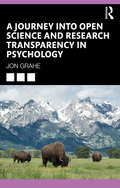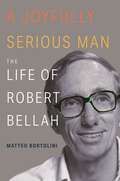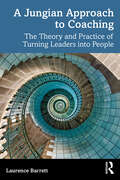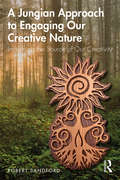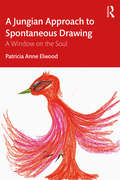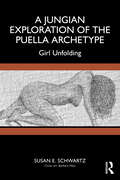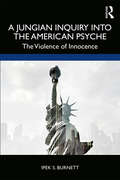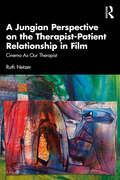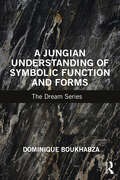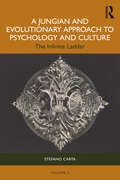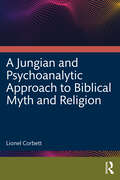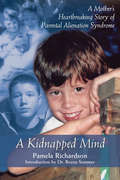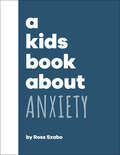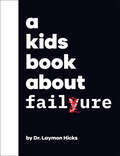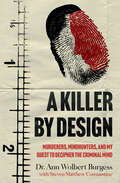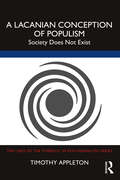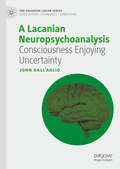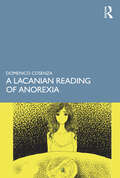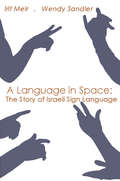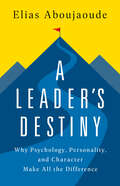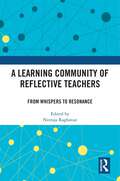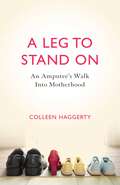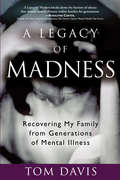- Table View
- List View
A Journey into Open Science and Research Transparency in Psychology
by Jon GraheA Journey into Open Science and Research Transparency in Psychology introduces the open science movement from psychology through a narrative that integrates song lyrics, national parks, and concerns about diversity, social justice, and sustainability. Along the way, readers receive practical guidance on how to plan and share their research, matching the ideals of scientific transparency. This book considers all the fundamental topics related to the open science movement, including: (a) causes of and responses to the Replication Crisis, (b) crowdsourcing and meta-science research, (c) preregistration, (d) statistical approaches, (e) questionable research practices, (f) research and publication ethics, (g) connections to career topics, (h) finding open science resources, (i) how open science initiatives promote diverse, just, and sustainable outcomes, and (j) the path moving forward. Each topic is introduced using terminology and language aimed at intermediate-level college students who have completed research methods courses. But the book invites all readers to reconsider their research approach and join the Scientific Revolution 2.0. Each chapter describes the associated content and includes exercises intended to help readers plan, conduct, and share their research. This short book is intended as a supplemental text for research methods courses or just a fun and informative exploration of the fundamental topics associated with the Replication Crisis in psychology and the resulting movement to increase scientific transparency in methods.
A Joyfully Serious Man: The Life of Robert Bellah
by Matteo BortoliniThe brilliant but turbulent life of a public intellectual who transformed the social sciencesRobert Bellah (1927–2013) was one of the most influential social scientists of the twentieth century. Trained as a sociologist, he crossed disciplinary boundaries in pursuit of a greater comprehension of religion as both a cultural phenomenon and a way to fathom the depths of the human condition. A Joyfully Serious Man is the definitive biography of this towering figure in modern intellectual life, and a revelatory portrait of a man who led an adventurous yet turbulent life.Drawing on Bellah's personal papers as well as in-depth interviews with those who knew him, Matteo Bortolini tells the story of an extraordinary scholarly career and an eventful and tempestuous life. He describes Bellah's exile from the United States during the hysteria of the McCarthy years, his crushing personal tragedies, and his experiments with sexuality. Bellah understood religion as a mysterious human institution that brings together the scattered pieces of individual and collective experiences. Bortolini shows how Bellah championed intellectual openness and innovation through his relentless opposition to any notion of secularization as a decline of religion and his ideas about the enduring tensions between individualism and community in American society.Based on nearly two decades of research, A Joyfully Serious Man is a revelatory chronicle of a leading public intellectual who was both a transformative thinker and a restless, passionate seeker.
A Jungian Analysis of Toxic Modern Society: Fighting the Culture of Loneliness
by Erik GoodwynUsing evidence from anthropology, neuroscience, psychiatry, analytical psychology, and evolutionary biology, within this book Dr. Erik Goodwyn explores the current cultural psyche, and how elements of modern society are contributing to the current loneliness epidemic.Despite tremendous advances in technology, developed countries are more anxious, depressed, suicidal, and addicted today than we were 100 years ago. Why? Research from many fields of study show that loneliness has become an epidemic in the industrialized world, causing very real medical consequences such as addiction, depression, anxiety, and suicide: all things which have been on the rise for decades. And yet, because of various historical, philosophical, and economic reasons, we do not nurture traditional cultural ways of satisfying these instincts. This book will explore the idea that stopping the rising misery will not only require socioeconomic changes, but will require a profound cultural change. Only then will we be able to stop the slow starvation of social belonging, archetypal narratives, rituals, spirituality, and images as vessels of meaning.This will be an insightful read for depth psychologists and scholars of analytical psychology, as well as health care providers, therapists, sociologists, and those with an interest in cross-cultural studies.
A Jungian Approach to Coaching: The Theory and Practice of Turning Leaders into People
by Laurence BarrettIn an increasingly superficial and disconnected world, Jungian psychology offers a more soulful alternative. It provides a frame within which we can more easily notice and understand the voice of the unconscious and its implications, allowing us to build deeper relationships and lead more meaningful lives. In this book, Laurence Barrett explores the fundamental principles and structures of Jung's model of the mind and considers ways in which these may be applied and extended to a modern coaching and consulting practice. It offers a deep but accessible insight to Jungian theory, supported by a wealth of source materials and rich examples from the author's own work and experience. A Jungian Approach to Coaching will help experienced coaches to better support individuals, groups, and organizations, in a rediscovery of their humanity and their potential. It will help turn leaders into people.
A Jungian Approach to Engaging Our Creative Nature: Imagining the Source of Our Creativity
by Robert SandfordEmbracing our creative nature as the heritage of all, this book seeks to foster the creative imagination by nurturing a fertile relationship with its source. Robert Sandford offers an alternative approach, taking up Jungian theory as arising from and embodying this sort of relationship. In the middle ground of imagination, we can engage creativity’s source on its own terms in image, metaphor, symbol, myth and dream. This book demonstrates how Jungian and archetypal psychologies, by treating image and imagination as central, can foster our creativity and bridge the gap between a Jungian understanding of art and creative processes. Created works incarnate the engaged, relational, imaginal acts that birthed them. This approach also yields invaluable insights for art therapy. Sandford seeks to heal the collective ailments that alienate us from our creative nature, such as the hegemony of literalism and our relationship with things, the body, the archetypal feminine, nature and cosmos. Uniquely, he brings together theory and practice by taking theorizing as a creative practice and, rather than offering procedures, opens an imaginal landscape where the creative impulse can arise and we can respond. Emphasizing the relational value of ideas, he draws from Jung and Hillman in a way that spans the work of both. This unique and innovatively interdisciplinary book will be essential reading for academics and students of Jungian and post-Jungian studies, creativity, expressive arts, embodied transformation, archetypal studies and arts therapies. It will be of immense interest to Jungian psychotherapists, analytical psychologist, Jungian art therapists and sandplay practitioners.
A Jungian Approach to Spontaneous Drawing: A Window on the Soul
by Patricia ElwoodIn A Jungian Approach to Spontaneous Drawing, Patricia Anne Elwood provides an accessible and thought-provoking introduction to exploring spontaneous images, focusing on the value of this tool for insight into the unconscious. Illustrated with drawings of clients throughout, the book poignantly demonstrates how one can connect and access the spheres within through drawing, and how this process can reveal the unexpected. Elwood begins by accessibly introducing key Jungian concepts and exploring Jung’s belief in the power of spontaneity as an invaluable tool in one’s journey to the soul. As well as illuminating spontaneity, an oft-forgotten aspect of Jung’s psychology, she explores themes including structure and dynamics, symbols and archetypal patterns. A Jungian Approach to Spontaneous Drawing also examines common motifs including houses, trees and people, and presents extended studies of work with children and adults and how their drawings relate and reveal Jungian ideas. Offering both practical and theoretical perspectives, this book demonstrates the universal benefits of spontaneous drawing for all age groups, helping people to find true release from unconscious blockages and traumas lying dormant in the depths of their own psyche. A Jungian Approach to Spontaneous Drawing will be essential reading for Jungian analysts, Jungian psychotherapists and analytical psychologists in practice and in training, as well as art therapists with an interest in Jung, and those working with children and adults. It would also be of immense interest to students on courses including art psychotherapy, counselling psychology, Jungian psychology with art therapy, and all those in the helping professions.
A Jungian Exploration of the Puella Archetype: Girl Unfolding
by Susan E. SchwartzThis fascinating new book explores the puella as an archetypal, symbolic and personality figure reaching into the classical foundations of Jungian analytical psychology, focusing on the modern conflicts reverberating personally and culturally to remove the obstacles for accessing our more complete selves.Puella is youthful, charming and seductive and unfolds the creative, unusual wisdom of the feminine. Postmodern fluidity presents other realities, rethinking and reenacting the truth to oneself. If denigrated, psyche is halted from development, until addressed. The author employs a cross‑disciplinary approach and clinical vignettes from narratives of real people from diverse backgrounds reflecting Jungian thought and treatment, along with other psychoanalytical perspectives for the unfolding of puella.Examining the puella as a key figure in psychological development within a diverse world, this book will be appealing to Jungian analysts, and also to mental health professionals of various paradigms interested in Jungian analytical and philosophical thought.
A Jungian Inquiry into the American Psyche: The Violence of Innocence
by Ipek S. BurnettIn A Jungian Inquiry into the American Psyche: The Violence of Innocence, Ipek Burnett’s penetrating cultural criticism enriched with psychoanalytical and Jungian insight offers a timely interrogation of national consciousness in the United States. Through evocative storytelling, Burnett unpacks the images and myths that run deep in the American psyche—from that of the New World, the city upon a hill, to the Manifest Destiny, the melting pot, and the pursuit of happiness. Against this backdrop, she investigates the vicious cycles of innocence and violence that have dominated American history and continue to reinforce systematic oppression in America, evident in racial and economic inequality, xenophobia, materialism, and more. Burnett’s thought-provoking analysis exposes the ways in which psychological defenses such as historical amnesia, projection, denial, and dissociation work on a collective level, helping America avoid a confrontation with these violent truths of its past and present circumstances, and its national character. With its seamless multidisciplinary approach and revealing insight, this book will be of great interest to psychologists, scholars, and students of Jungian and post-Jungian thought, depth psychology, and cultural and American studies. Eloquent and accessible, it will engage readers who strive to be self-reflective, well-informed global citizens. .
A Jungian Perspective on the Therapist-Patient Relationship in Film: Cinema As Our Therapist
by Ruth NetzerWithin this book, Ruth Netzer explores the archetypal components of therapist-patient relations in cinema from the perspective of Jungian archetypal symbolism, and within the context of myth and ritual.Film is a medium that is attracted to the extremes of this specific relationship, depicting the collapse of the accepted boundaries of therapyp; though on the other hand, cinema also loves the fantasy of therapy as intimacy. Through the medium of film, and employing examples from over 45 well-known films, the author analyzes the successes and failures of therapists within film, and reviews the concepts of transference and counter-transference and their therapeutic and redemptive powers, in contrast to their potential for destruction and exploitation within the context of a patient-therapist relationship.This book will be a fascinating read for Jungian analysts, psychologists, psychiatrists, and therapists with an interest in the link between cinema and therapy, as well as filmmakers and students and teachers of film studies.
A Jungian Understanding of Symbolic Function and Forms: The Dream Series
by Dominique BoukhabzaThe purpose of this book is to clarify the function of the symbol and its place at the juncture of psychoanalysis and other social sciences, where the singular and the collective intersect and whose laws are identical. The debate between Freud and Jung about the symbol is well known; by examining the points of contradiction between their respective approaches, this book seeks to place them in fruitful tension, rather than categorical opposition and explore their similarities and differences. In later chapters, the author further analyses the function of the symbol in relation to the topics of myth, anthropology and dreams. This thoughtful book will appeal to those interested and involved in analytical psychology and psychoanalysis, as well as psychiatrists and psychologists.
A Jungian and Evolutionary Approach to Psychology and Culture: The Infinite Ladder
by Stefano CartaThis ground-breaking book re-positions C.G. Jung's legacy, and the field of analytical psychology, within the panorama of contemporary knowledge in neurobiology, psychology, culture and anthropology.Within this new volume, Stefano Carta aims to provide a new, up-to-date way of understanding Jung's work, and to show the effect to which his central positions can be better understood in relation to topics such as the nature of the psyche, of the self, of the collective unconscious, and of archetypal theory. This book describes, with extensive substantiations and an original discussion, the transformation of psychological processes into cultural ones, leading to the formation of various forms of symbolic institutions.Spanning two volumes, which are also accessible as standalone books, and with international appeal and original and interdisciplinary in scope, they will be of great interest to Jungian scholars and analysts as well as students and those on Jungian-oriented training courses.
A Jungian and Psychoanalytic Approach to Biblical Myth and Religion
by Lionel CorbettThis book describes some of the major psychological processes that underpin various biblical stories and some of the theological speculation to which they have given rise. Psychological biblical criticism, as described here, is suggested as an alternative or supplement to historical-cultural, textual, philological, literary, and other types of biblical criticism.Using a combination of Jungian and psychoanalytic theory, Corbett shows how some biblical material arises from human psychodynamics, while some originates in the archetypal level of the psyche and is further elaborated as it passes through the human level of the psyche. The author addresses some of the traditional anxieties about psychological approaches to biblical stories. He views Jung’s approach as an evolving mythology of the sacred that offers an alternative to purely theological approaches to the Bible and to the traditions that emerged from it.This book will be of value to practicing psychotherapists and analysts, particularly those who treat patients with a religious background, as well as trainees, clergy, and graduate students in this area.
A Kidnapped Mind: A Mother's Heartbreaking Memoir of Parental Alienation
by Pamela RichardsonHow do we begin to describe our love for our children? Pamela Richardson shows us with her passionate memoir of life with and without her estranged son, Dash. From age five Dash suffered Parental Alienation Syndrome at the hands of his father. Indoctrinated to believe his mother had abandoned him, after years of monitored phone calls and impeded access eight-year-old Dash decided he didn’t want to be "forced" to visit her at all; later he told her he would never see her again if she took the case to court. But he didn’t count on his indefatigable mother’s fierce love. For eight more years Pamela battled Dash’s father, the legal system, their psychologist, the school system, and Dash himself to try and protect her son - first from his father, then from himself. A Kidnapped Mind is a heartrending and mesmerizing story of a Canadian mother’s exile from and reunion with her child, through grief and beyond, to peace.
A Kids Book About Anxiety: Kids Are Ready (A Kids Book)
by Ross SzaboAn honest exploration of the symptoms of anxiety and what learning to manage it can look like. This is a book about anxiety. Having anxiety doesn&’t just mean you feel nervous sometimes or need to calm down. It means having an uncontrollable feeling that gets in the way of what you normally do, or something new that you&’d like to do. Covering themes of anxiety, fear, loneliness, and crying. This book for kids aged 5-9 explores the impact anxiety can have and the steps they can take to begin to manage any anxious feelings they might have. A Kids Book About Anxiety features: - A large and bold, yet minimalist type-driven design that allows kids freedom to imagine themselves in the words on the pages.- A friendly, approachable, yet empowering, kid-appropriate tone throughout.- An author who has first-hand experience on the topic of anxiety.Tackling important discourse together! The A Kids Book About series are best used when read together. Helping to kickstart challenging, empowering, and important conversations for kids and their grownups through beautiful and thought-provoking pages. The series supports an incredible and diverse group of authors, who are either experts in their field, or have first-hand experience on the topic. A Kids Co. is a new kind of media company enabling kids to explore big topics in a new and engaging way. With a growing series of books, podcasts and blogs, made to empower. Learn more about us online by searching for A Kids Co.
A Kids Book About Failure: Kids Are Ready (A Kids Book)
by Dr. Laymon HicksA clear explanation of what failure is, helping to turn negative feelings from it into important life lessons.Failure is something that everyone encounters at some point in their lives, no matter how much you try to avoid it. Whether that&’s in school, in a friendship, or even playing your favourite sport, success is not a 100% certainty.Grownups, it&’s up to you to teach kids how to embrace it. This book doesn&’t paint a pretty face on failure. Instead, it rethinks what it means, and shows kids aged 5-9 how to live their lives not trying to avoid it.Teach kids the importance of failure, how to reframe negative feelings surrounding the inevitability of it, and how we can learn from it.A Kids Book About Failure features: - A large and bold, yet minimalist font design that allows kids freedom to imagine themselves in the words on the pages.- A friendly, approachable, yet empowering, kid-appropriate tone throughout.- An incredible and diverse group of authors in the series who are experts or have first-hand experience of the topic.Tackling important discourse together! The A Kids Book About series are best used when read together. Helping to kickstart important, challenging, and empowering conversations for kids and their grownups through beautiful and thought-provoking pages. The series supports an incredible and diverse group of authors, who are either experts in their field, or have first-hand experience on the topic. A Kids Co. is a new kind of media company enabling kids to explore big topics in a new and engaging way. With a growing series of books, podcasts and blogs, made to empower. Learn more about us online by searching for A Kids Co.
A Killer By Design: Murderers, Mindhunters, and My Quest to Decipher the Criminal Mind
by Ann Wolbert Burgess Steven Matthew Constantine'I think you have something here' I said, 'This could lead to a whole new way of understanding criminal behaviour. As far as I know no one's ever tried to figure out why serial killers kill. The implications are profound.' Haunting, heartfelt, and deeply human, Dr Ann Burgess's remarkable memoir combines a riveting personal narrative of fearless feminism and ambition, bone-chilling encounters with real-life monsters, and a revealing portrait of the ever-evolving US criminal justice system. A Killer By Design will inspire, terrify, and enlighten you in equal measure.It forces us to confront the age-old question 'What drives someone to kill, and how can we stop them?' 'Of all the colleagues I've worked with, Ann is one of the sharpest – and one of the toughest ... She taught us how to harness the chaos of serial killers' minds and helped us decipher the undecipherable. I'd recommend that everyone read A Killer By Design; not only is it a great page-turner, but it's about time Ann's story was heard' - JOHN E. DOUGLAS, former FBI criminal profiler and bestselling author of Mindhunter.
A Lacanian Conception of Populism: Society Does Not Exist
by Timothy AppletonA Lacanian Conception of Populism takes issue with traditional theories of populism, which seek to equate populism with hegemony, arguing that these are not only different but even incompatible logics. Timothy Appleton contends that one of the main differences between populism and hegemony has to do with the social totality: while hegemony absolutises it, populism eviscerates it, setting in its place an (apparently paradoxical) dispersion of singular instances of ‘the people’. The book considers the work of Laclau, Badiou, Žižek and Rancière, before arriving at a novel conceptualisation that Appleton dubs ‘the populism of singularities’. In the second half of the book, the author draws out the consequences of this concept for contemporary political theory: the question of how to define ‘left’ and ‘right’; the question of popular enthusiasm and affect; ‘truth’ versus ‘post-truth’; the question of leadership; populism and nationalism; and the relation between populism and political parties. A Lacanian Conception of Populism will be key reading for academics and scholars of political theory, political philosophy, post-Marxist thought, discourse theory and psychoanalysis. It will also be of interest to those working in the areas of populism studies, cultural studies, gender studies and queer theory.
A Lacanian Neuropsychoanalysis: Consciousness Enjoying Uncertainty (The Palgrave Lacan Series)
by John Dall’AglioThis book brings together Lacanian psychoanalysis, neuropsychoanalytic work by Mark Solms and Ariane Bazan, Jaak Panksepp’s affective neuroscience, Karl Friston’s free energy principle, Adrian Johnston’s transcendental materialist philosophy, and Darian Leader’s critique of jouissance in Lacanian theory. In doing so, it articulates a philosophical and scientific basis for Lacanian neuropsychoanalysis. A Lacanian perspective on Solms’s recent neuropsychoanalytic developments in affective consciousness and predictive coding furnishes an immanent critique that advances both Lacanian psychoanalysis and neuropsychoanalysis. Dall’Aglio develops novel propositions for conceptualizing the Lacanian real, symbolic, and imaginary registers in the brain, treating affect systems like signifiers, viewing jouissance as surplus prediction error, and conceiving the brain as structurally antagonistic. It presents fresh theoretical and clinical insights in a manner that will be accessible to the interdisciplinary fields it draws upon. It will appeal to those working in neuropsychoanalysis, clinical psychology, neuroscience, psychoanalysis, and critical theory.
A Lacanian Reading of Anorexia
by Domenico CosenzaThis book presents a Lacanian perspective on the understanding and treatment of anorexia, supported by case material, research and theoretical insight from the author’s 25 years of clinical practice. Domenico Cosenza explains how anorexia constitutes a challenge for contemporary psychoanalytic clinicians, assesses previous theoretical understandings and examines clinical contributions from other schools of psychoanalysis. Cosenza argues that anorexia cannot be treated by following a classical psychoanalytic path, and here draws on numerous clinical cases to articulate a Lacanian approach which addresses core concerns not resolved elsewhere. Elaborating on Lacanian concepts including refusal and the object nothing, Cosenza offers a new approach for all psychoanalytically-informed clinicians working with anorexia. A Lacanian Reading of Anorexia will be of great interest to psychoanalysts, psychiatrists, clinical psychologists and psychotherapists interested in Lacanian perspectives and the dynamic-analytical approach in the treatment of anorexia.
A Lady Undone: A Mad Passions Novella 2.5 (Mad Passions)
by Maire ClaremontIn this dazzling novella from the award-winning author of The Dark Lady and Lady In Red, comes a story of fatal plots, seductive spies, and irresistible passions... Perfect for fans of Sherry Thomas, Lisa Kleypas and Stephanie Laurens.Duchess Clare Ederly is lucky to be alive. Having outlived her violent, abusive husband, she decides to put her significant inheritance to good use helping other battered women by opening a refuge for those seeking to escape. But not everyone is pleased with her work. Someone wants to see her sanctuary torn down - at any cost. Her only hope of protecting her home and tenants is a former spy, whose skill at tracking deadly men is matched only by his dangerous charm...The Earl of Wyndham has done his part for Queen and country; he has had his fill of plotting and politics and simply wants to retire to the pleasant life of his club. But Duchess Clare's razor-sharp wit and fierce determination awaken new purpose and admiration in him. To protect her, he will once again delve into the treacherous world of espionage. To win her love, he will do almost anything...For more deliciously dark Victorian romance, try all the titles in the Mad Passions series: The Dark Lady, Lady In Red, A Lady Undone and The Dark Affair, and check out Maire's alter-ego Eva Devon for sexy and laugh-out-loud funny Regencies.
A Language in Space: The Story of Israeli Sign Language
by Irit Meir Wendy SandlerThis English version of A Language in Space: The Story of Israeli Sign Language, which received the Bahat Award for most outstanding book for a general audience in its Hebrew edition, is an introduction to sign language using Israeli Sign Language (ISL) as a model. Authors Irit Meir and Wendy Sandler offer a glimpse into a number of fascinatin
A Leader's Destiny: Why Psychology, Personality, and Character Make All the Difference
by Elias AboujaoudeA psychiatrist puts leadership &“on the couch,&” with a provocative exploration of its crucial, often ignored, psychological and personal character foundations. Elias Aboujaoude&’s distinctive exploration of leadership explains how our cultlike obsession with leadership gives narcissists and sociopaths an edge and results in leadership failure everywhere we look—and how resisting the imperative to rise at all costs leaves many with an inferiority complex. His takedown of the leadership industrial complex pokes a very sharp elbow into an industry seemingly united in a modern form of alchemy to create leadership gold—a waste of time and money, Aboujaoude vividly illustrates, since leaders emerge from a unique combination of personal, psychological, and situational factors that cannot be easily controlled or manipulated, no matter how gifted the executive coach. This bracing take on a classic subject provides new insight into the way psychology aligns with the requirements of effective and happy leadership. The result is to empower us to understand ourselves and step up if we have what it takes to lead—or find equally rewarding, often superior, ways to achieve fulfillment if we don&’t.
A Learning Community of Reflective Teachers: From Whispers to Resonance
by Neeraja RaghavanTeachers possess a wealth of untapped wisdom and valuable experience. Whether it’s in matter of educational policy, curriculum development or textbook selection, teachers carry a trove of information and insights to share. Traditionally, teacher development has been driven by administrators of schools, and it often takes the form of a ‘mentor’ teaching the staff of a school. But what happens when teachers across different locations collaborate and learn together? This volume documents such an initiative, sparked off by the Covid-19 pandemic, which brought people together online. It underscores the power of teachers debating, discussing, and learning from each other. Based on an Indian experience, the book addresses a range of issues teachers and educators face across the world — encompassing pedagogy, classroom management, school culture and teacher development. A unique story of community building and teacher education, this book also contains key outcomes and insights which take us through their action research projects and showcases a model of teacher development that can be adopted by interested readers. Above all, it brings out the crying need for a teacher’s voice to be heard — for far too long, teachers have been mere implementers of decisions taken by policy makers or managements of schools. By means of networking communities such as the one described in this book, the transformation of teachers going from whispers to resonance is greatly amplified. An important intervention in the domain of teacher development, this volume will be of great interest to students, researchers and practitioners of education, teacher education, and sociology of education. It will also be useful for teacher trainees, academicians, teacher educators, policymakers, schoolteachers, curriculum developers, teacher training institutes, and universities offering teacher education programs.
A Leg to Stand On: An Amputee's Walk into Motherhood
by Colleen HaggertyWhen Colleen Haggerty lost her leg in an accident during her senior year of high school, she could have retreated from life and let her disability become her defining quality—and no one would have blamed her for it. Instead, she went the opposite way. In the years following her accident, Haggerty explored her physical world with vigor, testing the limits of her body by joining a ski team, playing with a co-ed soccer team, and taking up kayaking and backpacking. She also tested the limits of her heart, pursuing love and passion with restless men. In A Leg to Stand On, Haggerty recounts her life as a disabled woman, from redefining herself as a young woman after tragedy—fierce and able, but haunted by hard choices and suppressed grief—to choosing marriage and motherhood. That choice comes at great cost to the physical freedom Haggerty has fought for, but ultimately she redemption, fulfillment, and self-acceptance in the bargain. No one will read this book without being inspired to accept their past and create the future they always wanted.
A Legacy of Madness
by Tom DavisThe story of a loving family coming to grips with its own fragilities, A Legacy of Madness relays the author's journey to uncover, and ultimately understand, the history of mental illness that led generations of his suburban American family to their demise.Dede Davis had worried, fussed, and obsessed for the last time: Her heart stopped beating in a fit of anxiety. In the wake of his mother's death, Tom Davis knew one thing: Helplessly self-absorbed and severely obsessive compulsive, Dede led a tormented life. She spent years bouncing around mental health facilities, nursing homes, and assisted-living facilities, but what really caused her death? A Legacy of Madness portrays Tom Davis's captivating discoveries of mental illness throughout generations of his family. Investigating his mother's history led to that of Davis's grandfather, a top administrator at one of the largest psychiatric hospitals in the country; his great-grandfather who died of self-inflicted gas asphyxiation during the Depression; and his great-great grandmother who, with her eldest son, completed suicide one tragic day. Ultimately, four generations of family members showed clear signs of depression, obsessive-compulsive disorder, and alcoholism--often mistreated illnesses that test one's ability to cope. Through this intimate memoir, we join Davis on a personal odyssey to ensure that he and his siblings, the fifth generation,--recover their family legacy by not only surviving their own mental health disorders but by getting the help they need to lead healthy, balanced lives. In the end, we witness Davis's powerful transition as he makes peace with the past and heals through forgiveness and compassion for his family--and himself. About the author Tom Davis is the Jersey Shore regional editor for Patch.com and an adjunct professor of journalism at Rutgers University. This is his first book. He lives in Metuchen, New Jersey.
